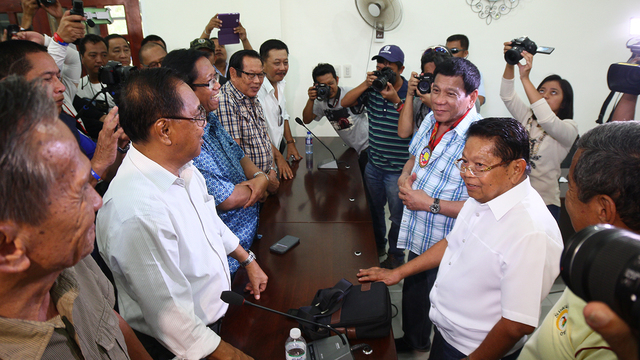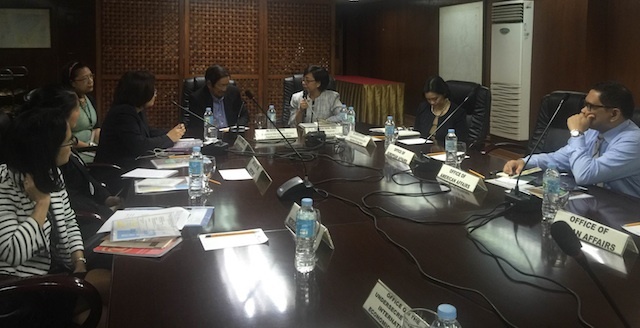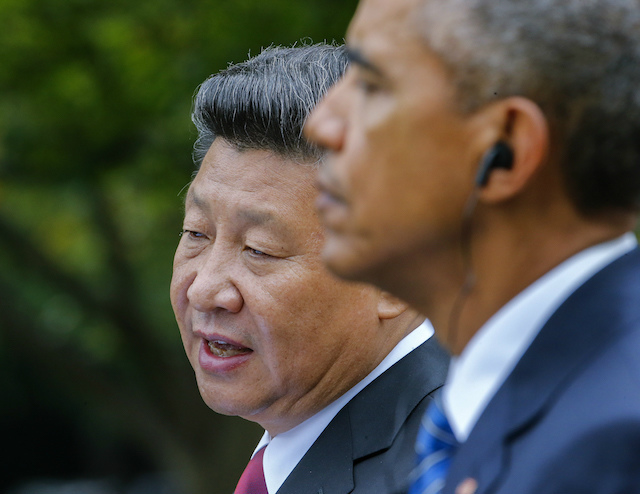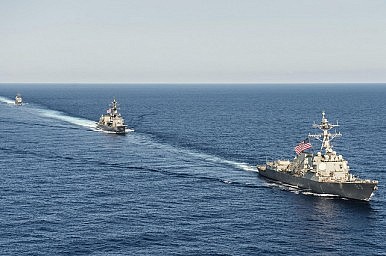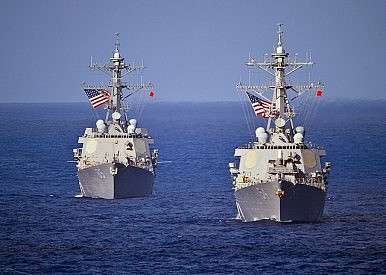The U.S. Freedom of Navigation (FON) Program has received more attention in the past year than perhaps the Program’s preceding 35 years combined, due largely to ongoing developments in the South China Sea. Official summaries of the Program provided by the U.S. Departments of
State and
Defense are informative, but are not necessarily exhaustive in depth, due to a number of reasons. This informational lacuna has led to a series of commentaries by outside observers seeking to fill in factual gaps, make logical connections, extrapolate intentions, and forecast future events. But some of those commentaries have been less than fully accurate, warranting
substantive correction by those having direct experience with the FON Program. Below is another such effort to help inform the public discussion on a particular aspect of the Program as it pertains to the legal concept known as the right of innocent passage.
Recently, a commentary on the U.S. FON Program was penned by former Pentagon China-policy desk officer Joseph Bosco and
published by
The National Interest. While Bosco has commented about the U.S. FON Program previously
here,
here, and
here, this latest commentary was especially critical of recent U.S. FON operations (FONOPs) in the South China Sea. In particular, he described the nature of those operations as “contradictory.” Although some of his ideas about the implementation of the U.S. FON Program may warrant consideration by policymakers and security-watchers alike, a closer examination of one of his criticisms suggests that he might have a fundamental misunderstanding about the nature of the U.S. FON Program and a particular subcategory of FONOPs conducted under that Program. Specifically, Bosco erroneously assumes that FONOPs and “innocent passage” are somehow mutually exclusive concepts – a point that some other commentators have also erroneously assumed. The commentary below will attempt to correct that misunderstanding. Additionally, it will outline how analysis and recommendations flowing from that underlying assumption can be questionable.
An Assumption Made About Recent U.S. FONOPs
In his new commentary, Bosco examines the words and actions of the U.S. government surrounding two recent FONOPs in the South China Sea. First, he
criticizes statements purportedly made by (albeit anonymous) DoD officials soon after the October 2015 FONOP by USS
Lassen in the vicinity of the Spratly Islands group. He describes those comments as “conflicting accounts on whether [the transit] was a Freedom of Navigation (FONOP) or innocent passage (IP).” (Personally, I would agree that anonymous comments can be extremely unhelpful in such situations – but for entirely different reasons, such as lack of quality assurance as to their factual and legal accuracy.) Then, he criticizes the December 2015
letter by Secretary of Defense Ashton Carter to Senator John McCain about that same FONOP. He
characterizes the Secretary’s public account as “a novel and startling resolution of the FONOP-IP dichotomy” – namely, that the
Lassen was “doing both” simultaneously.
Second, Bosco
criticizes DoD’s public
account of a January 2016 FONOP by USS
Curtis Wilbur in the vicinity of the Paracel Islands group. Here again, he questions how the Department can describe the warship’s transit “as simultaneously both a [FON operation] and an [innocent passage].” He
characterizes this situation as “an operational impossibility” because a FONOP “challenges a claim to territorial seas,” and innocent passage “concedes and respects” such claim. In essence, Bosco assumes that a transit by a warship in the oceans of the world can be either a FONOP or an “innocent passage,” but not both.
It is worth noting that Bosco is
not the only observer to make this assumption recently. For example, Euan Graham, a security affairs expert from the United Kingdom,
wrote the following for
The National Interest on the same subject in November: “FONOPs and innocent passage are quite different things.” Other examples of similar binary assumptions about FONOPs and innocent passage can be found
here,
here, and
here. Unfortunately, these assumptions made by Bosco and other observers are invalid, especially when one understands the relevant concepts of international law and the nature of the U.S. FON Program.
The International Law of the Sea and the Right of Innocent Passage
At the outset, it is important to recognize the concept of innocent passage and how it relates to the international legal regime applicable to the oceans, as reflected in the
U.N. Convention on the Law of the Sea (UNCLOS). As reflected in Article 2(1) of UNCLOS, a coastal state has sovereignty over its land territory, internal waters, and territorial sea. Yet Article 2(3) of UNCLOS also makes it clear that a State’s sovereignty over its territorial sea is subject to other rules of international law. One of those other rules is the “right of innocent passage.” Under Article 17 of UNCLOS, ships of all States “enjoy the right of innocent passage through the territorial sea” of other States. (For readers who might question how the United States can invoke Article 17 of UNCLOS when it is not yet a State party to the Convention, it is important to note that the United States
asserts and the International Court of Justice has
ruled that the right of innocent passage is a right enjoyed by all States as a matter of customary international law.)
What is critical to realize is that “innocent passage” is a legal term of art in the international law of the sea. The modifier of “innocent” on the activity of “passage” is not subject to
ad hoc determinations by individual coastal states. Instead, Article 19(1) of UNCLOS defines passage as being innocent if the navigation of the vessel through the territorial sea “is not prejudicial to the peace, good order or security of the coastal state.” The drafters and negotiators of UNCLOS understood that a similar definition of innocent passage in
one of the 1958 treaties preceding UNCLOS was at risk of subjective interpretation varying among coastal states. For this reason, Article 19(2) of UNCLOS elaborates that passage is not innocent (i.e., prejudicial to the peace, good order or security of the coastal state) if it includes activities that fit within one of twelve enumerated categories of activities. Therefore, “innocent passage” is not synonymous with only those particular passages of foreign vessels that the particular coastal state having sovereignty over the traversed waters likes, permits, or approves. To fall outside of the parameters of the right of innocent passage, a vessel would need to be engaged in one or more of the twelve enumerated categories of activities.
At the same time, each coastal state has the authority to adopt laws and regulations relating to innocent passage. But that authority is not unlimited; rather it may be exercised only for the enumerated purposes outlined in Article 21 of UNCLOS. Moreover, Article 24 of UNCLOS makes it clear that a coastal state shall not “impose requirements on foreign ships which have the practical effect of denying or impairing the right of innocent passage.” For example, a national law or regulation enacted by a coastal state that purportedly requires foreign warships to obtain prior authorization from, or provide prior notification to, the coastal state before navigating through its territorial sea under the right of innocent passage would breach the duty of coastal states reflected in Article 24.
Notwithstanding the purposes enumerated in Article 21 and the limitations imposed by Article 24, some coastal states have enacted laws and regulations for their territorial seas that impair or restrict the right of innocent passage reflected in UNCLOS. These are situations in which the U.S. FON Program comes into play.
The U.S. Freedom of Navigation Program and the Right of Innocent Passage
Since the U.S. FON Program’s inception, a fundamental guiding
principle has been to “not acquiesce in unilateral acts of other states designed to restrict” the freedom of the seas. As was clarified last August in the DoD maritime security
strategy, freedom of the seas means “
all [emphasis added] of the rights, freedoms, and lawful uses of the sea and airspace, including for military ships and aircraft, recognized under international law.” Reaffirming UNCLOS, this freedom of the seas includes, among others: the rights of innocent passage (Article 17), transit passage (Article 38), archipelagic sea lanes passage (Article 53), the freedoms of navigation and overflight and “other internationally lawful uses of the sea” (Article 58), and the freedom of the high seas (Article 87). Thus, despite efforts by some to narrowly construe what international law guarantees to States in the oceans and airspace of the world, the phrase “freedom of the seas” legitimately includes far more than the freedom for commercial vessels.
Implementing the U.S. FON Program, the U.S. Department of Defense
defines freedom of navigation operations as “operations that have the primary purpose of challenging excessive maritime claims.” This begs the question: what is an excessive maritime claim? The Department
defines an excessive maritime claim to be “a coastal state’s maritime claim, enacted by national law, regulation, or policy, that is not consistent with international law as reflected in the Convention.” Therefore, a coastal state’s law that improperly restricts the right of innocent passage would
by definition constitute an excessive maritime claim. And the navigation by a U.S. warship through that coastal state’s territorial sea with the primary purpose of challenging that excessive maritime claim would
by definition constitute a FONOP.
U.S. FONOPs and the Right of Innocent Passage
This not merely an academic exercise in syllogisms. Globally, U.S. public
records confirm that DoD has conducted FONOPs repeatedly to challenge excessive maritime claims attempting to impede the right of innocent passage. More specifically, in the South China Sea, consider the recent FONOP within 12 nautical miles of Triton Island in the Paracel Island group. The official
statement released by the Office of the U.S. Secretary of Defense said, in part: “This operation challenged attempts by the three claimants, China, Taiwan and Vietnam, to restrict navigation rights and freedoms around the features they claim by policies that require prior permission or notification of transit within territorial seas. The excessive claims regarding Triton Island are inconsistent with international law as reflected in the Law of the Sea Convention.” In essence, the laws of
China,
Taiwan, and
Vietnam each contain language that appears to impede the right of innocent passage in their respective territorial sea. Those claims are excessive maritime claims, in relation to existing body of international law. (It should be noted that, Article 2(2) of Vietnam’s 2012
Law of the Sea provides: “In case there are differences between the provisions of this Law and those of an international treaty to which the Socialist Republic of Vietnam is a party, the provisions of the international treaty shall prevail.” Additionally, regarding the USS
Curtis Wilbur FONOP, the government of Vietnam issued a
statement that “Vietnam respects the right of innocent passage through the territorial sea conducted in accordance with relevant rules of international law, in particular the UNCLOS (Article 17).”) The ways for the United States and other nations to demonstrate non-acquiescence to those excessive maritime claims are through State actions – specifically, diplomatic protests and operational challenges. Such operational challenges would include FONOPs.
Make no mistake:
Not every FONOP involves the right of innocent passage. Coastal states enact maritime laws governing each of their maritime zones, including but not limited to the territorial sea (e.g., internal waters, contiguous zone, and exclusive economic zone). Each of those maritime claims must fully comport with the applicable rules of international law, including the rules of law reflected in UNCLOS. If such claims are inconsistent with international law, then they are excessive maritime claims, making them subject to challenge under the U.S. FON Program. Consequently, some U.S. FONOPs are planned, approved, and executed in order to challenge a maritime claim that restricts the freedom of the seas in a particular coastal state’s maritime zone
other than its territorial sea.
For this reason, not every U.S. FONOP is an exercise of the right of innocent passage. In fact, there are a number of circumstances in which a particular FONOP should be conducted in a manner that is
in some way inconsistent with what is permitted under the right of innocent passage. For example, if a coastal state were to claim a territorial sea around a geographic feature that is not otherwise entitled to a territorial sea (i.e., a submerged feature or an artificial island located more than 12 nautical miles from a legitimate island), then the activities conducted during that FONOP would need to be consistent with the high seas freedoms reflected in Articles 87 and 58 of UNCLOS. To demonstrate U.S. non-acquiescence with an improper claim of a territorial sea around such a submerged feature or artificial island, a U.S. FONOP would need to include either navigation that is not “passage” (i.e., not “continuous and expeditious” as required by Article 18) or some sort of activity that is not “innocent” (i.e., activities that fall within the twelve enumerated activities listed in Article 19).
Did the recent USS
Curtis Wilbur FONOP near Triton Island constitute one of those situations (i.e., a FONOP that needed to be inconsistent with the parameters of the right of innocent passage)? The short answer is: No. It is worth
reiterating that all U.S. FONOPs are guided, managed, planned and executed in a manner that is fully consistent with international law, but in some way inconsistent with the excessive elements of the coastal state’s laws or regulations. Therefore, regardless of which claimant has sovereignty of Triton Island, it appears that (a) Triton Island is a legitimate island, as defined by Article 121(1) of UNCLOS, thereby entitled to a territorial sea and (b) that island does not belong to the United States, but some other State. Therefore, a transit by a U.S. warship through the territorial sea surrounding that island would need to be under the right of innocent passage.
Conclusion
When discussing the USS
Curtis Wilbur FONOP, however, Bosco makes the following parenthetical
assessment: “Again, FONOP challenges a claim to a territorial sea, and [Innocent Passage] concedes and respects it.” That assessment would be correct only for a situation involving an unlawful claim to a territorial sea (e.g., around a submerged feature or artificial island). Unfortunately, this overbroad conclusion skews his analysis thereafter. First, he expresses concern that the DoD statement released soon after the USS
Curtis Wilbur FONOP reflects “a concerted administration policy to create a hybrid maritime concept.” (It does not.) Second, he complains that the United States and China have reached some sort of bilateral “modus vivendi.” (They did not.) Third, he extrapolates a disturbing “precedent” that the “Navy’s FONOPs in the Taiwan Strait, the Persian Gulf, and elsewhere have actually been occurring as disguised [Innocent Passage] operations.” (They have not.) And, fourth, he calls upon Congress to hold hearings to investigate the subject. (They should not.) Thus, we see one overbroad assumption at the start resulting in flawed analysis and recommendations in the end.
In summary, it is not an “operational impossibility” (to borrow Bosco’s phrase) for a U.S. warship to conduct a FONOP challenging an excessive maritime claim, and to exercise the right of innocent passage simultaneously. To the contrary, if depicted as a Venn diagram, FONOPs and innocent passage would be overlapping circles,
not mutually exclusive ones. In fact, the United States has routinely conducted FONOPs to preserve the right of innocent passage for many years, consistent with applicable international law and longstanding U.S. FON Policy. Hence, there’s no need to whistle the theme song to “Mission Impossible.”
[Commander Jonathan G. Odom is a judge advocate (i.e., licensed attorney) in the U.S. Navy. Currently, he serves as a Professor of Law in the College of Security Studies at the Daniel K. Inouye Asia-Pacific Center for Security Studies in Honolulu, Hawaii, where he teaches international law, national security law, oceans policy, and maritime security. From 2012 to August 2015, he served as the Oceans Policy Advisor in the Office of the Secretary of Defense. From 2008 to 2012, he served as the Deputy Staff Judge Advocate (i.e., deputy legal advisor) to Commander, U.S. Pacific Command. The views expressed are his own and do not necessarily reflect the positions of the U.S. Department of Defense or any of its components. He may be contacted at jonathan.odom@usa.com.]
http://thediplomat.com/2016/02/fonops-to-preserve-the-right-of-innocent-passage/

